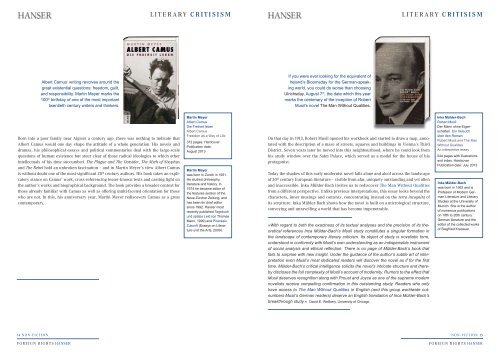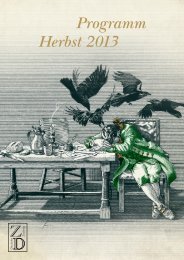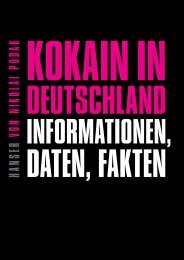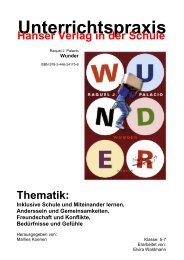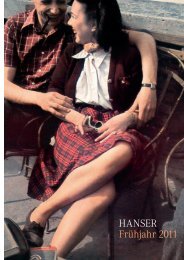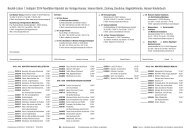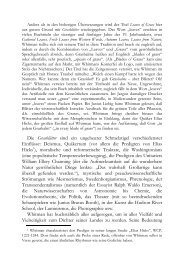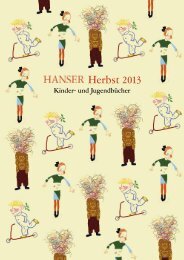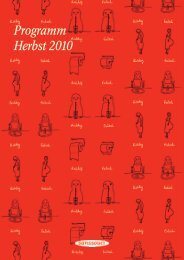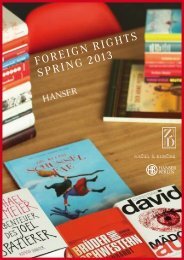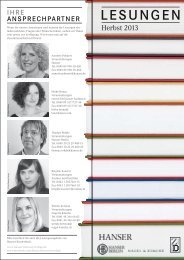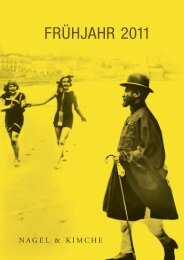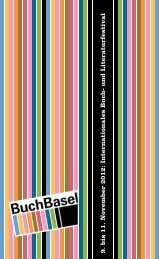FOREIGN RIGHTS AUTUMN 2013 - Hanser Literaturverlage
FOREIGN RIGHTS AUTUMN 2013 - Hanser Literaturverlage
FOREIGN RIGHTS AUTUMN 2013 - Hanser Literaturverlage
You also want an ePaper? Increase the reach of your titles
YUMPU automatically turns print PDFs into web optimized ePapers that Google loves.
L I T E R A RY C R I T I S I S M<br />
L I T E R A RY C R I T I S I S M<br />
Albert Camus‘ writing revolves around the<br />
great existential questions: freedom, guilt,<br />
and responsibility. Martin Meyer marks the<br />
100 th birthday of one of the most important<br />
twentieth century writers and thinkers.<br />
If you were ever looking for the equivalent of<br />
Ireland’s Bloomsday for the German-speaking<br />
world, you could do worse than choosing<br />
Ulrichsday, August 7 th , the date which this year<br />
marks the centenary of the inception of Robert<br />
Musil’s novel The Man Without Qualities.<br />
Born into a poor family near Algiers a century ago, there was nothing to indicate that<br />
Albert Camus would one day shape the attitude of a whole generation. His novels and<br />
dramas, his philosophical essays and political commentaries deal with the large-scale<br />
questions of human existence but steer clear of those radical ideologies to which other<br />
intellectuals of his time succumbed. The Plague and The Outsider, The Myth of Sisyphus<br />
and The Rebel hold an unbroken fascination – and in Martin Meyer’s view Albert Camus<br />
is without doubt one of the most significant 20 th century authors. His book takes an explicatory<br />
stance on Camus’ work, cross-referencing lesser-known texts and casting light on<br />
the author’s works and biographical background. The book provides a broader context for<br />
those already familiar with Camus as well as offering multi-faceted orientation for those<br />
who are not. In this, his anniversary year, Martin Meyer rediscovers Camus as a great<br />
contemporary.<br />
Martin Meyer<br />
Albert Camus<br />
Die Freiheit leben<br />
Albert Camus<br />
Freedom as a Way of Life<br />
372 pages. Hardcover<br />
Publication date:<br />
August <strong>2013</strong><br />
Martin Meyer<br />
was born in Zurich in 1951.<br />
He studied philosophy,<br />
literature and history. In<br />
1974 he became editor of<br />
the features section of the<br />
Neue Zürcher Zeitung, and<br />
has been its chief editor<br />
since 1992. <strong>Hanser</strong> most<br />
recently published Tagebuch<br />
und spätes Leid (on Thomas<br />
Mann, 1999) and Piranesis<br />
Zukunft (Essays on Literature<br />
und the Arts, 2009).<br />
On that day in 1913, Robert Musil opened his workbook and started to draw a map, annotated<br />
with the description of a maze of streets, squares and buildings in Vienna’s Third<br />
District. Seven years later he moved into this neighbourhood, where he could look from<br />
his study window over the Salm Palace, which served as a model for the house of his<br />
protagonist.<br />
Today the shadow of this early modernist novel falls alone and aloof across the landscape<br />
of 20 th century European literature – visible from afar, uniquely outstanding and yet alien<br />
and inaccessible. Inka Mülder-Bach invites us to rediscover The Man Without Qualities<br />
from a different perspective. Unlike previous interpretations, this essay looks beyond the<br />
characters, inner musings and contexts, concentrating instead on the terra incognita of<br />
its structure. Inka Mülder-Bach shows how the novel is built on a micrological structure,<br />
conveying and unravelling a world that has become impenetrable.<br />
»With regard to both the exactness of its textual analyses and the precision of its theoretical<br />
references Inca Mülder-Bach’s Musil study constitutes a singular formation in<br />
the landscape of contemporary literary criticism. Its object of study is novelistic form,<br />
understood in conformity with Musil’s own understanding as an indispensible instrument<br />
of social analysis and ethical reflection. There is no page of Mülder-Bach’s book that<br />
fails to surprise with new insight. Under the guidance of the author’s subtle art of interpretation<br />
even Musil’s most dedicated readers will discover the novel as if for the first<br />
time. Mülder-Bach’s critical intelligence solicits the novel’s intricate structure and thereby<br />
discloses the full complexity of Musil’s account of modernity. Rumors to the effect that<br />
Musil deserves recognition along with Proust and Joyce as one of the supreme modern<br />
novelists receive compelling confirmation in this outstanding study. Readers who only<br />
have access to The Man Without Qualities in English (and this group worldwide outnumbers<br />
Musil’s German readers) deserve an English translation of Inca Mülder-Bach’s<br />
breakthrough study.« David E. Wellbery, University of Chicago<br />
Inka Mülder-Bach<br />
Robert Musil<br />
Der Mann ohne Eigenschaften.<br />
Ein Versuch<br />
über den Roman<br />
Robert Musil and The Man<br />
Without Qualities<br />
An interpretive essay<br />
544 pages with illustrations<br />
and index. Hardcover<br />
Publication date: July <strong>2013</strong><br />
Inka Mülder-Bach<br />
was born in 1953 and is<br />
Professor of Modern German<br />
Literature and Literary<br />
Studies at the University of<br />
Munich. She is the author<br />
of numerous publications<br />
on 18th to 20th century<br />
German literature and the<br />
editor of the collected works<br />
of Siegfried Kracauer.<br />
14 N O N - F I C T I O N<br />
N O N - F I C T I O N 15<br />
F O R E I G N R I G H T S HANSER<br />
F O R E I G N R I G H T S HANSER


